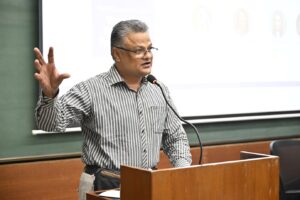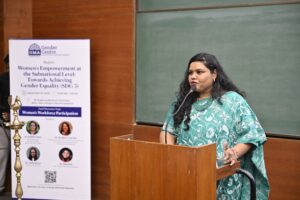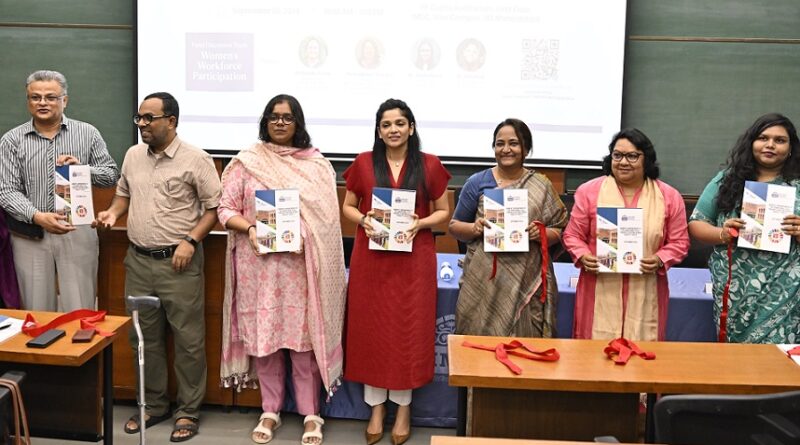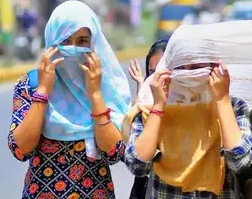IIMA Launches Comprehensive Report on Women’s Empowerment in India: Visible Progress, Challenges Remain
Gender Centre at IIMA releases Women Empowerment Index, highlighting district-level insights towards achieving SDG 5 on gender equality
BILKULONLINE
Ahmedabad, Sep 21: The Gender Centre at the Indian Institute of Management Ahmedabad (IIMA) has unveiled a landmark report, “Women’s Empowerment at the Subnational Level: Towards Achieving Gender Equality (SDG 5),” offering a detailed district-level analysis of women’s empowerment across India.
The report, presented by Professor Satish Deodhar, Dean (Faculty), and Professor Vidya Vemireddy, Chairperson, Gender Centre, introduces a Women Empowerment Index (WEI), designed to measure empowerment at the district level in alignment with the Sustainable Development Goal 5 (SDG 5) on gender equality.

Key Findings of the Report
The report analyses data from 705 districts across India, using comprehensive data sources including National Family Health Surveys 4 and 5 (NFHS-4 & NFHS-5). Some significant findings include:
Decision-Making and Mobility: 67.5% of districts reported progress, with increased women’s involvement in decision-making concerning healthcare, household purchases, and financial autonomy.
Asset Ownership: The percentage of women owning assets (land or house) either solely or jointly increased from 29.09% in NFHS-4 to 35.00% in NFHS-5.
Work-Life Balance: Only 32.25% of districts reported women achieving a balance between paid and unpaid work, signaling significant room for improvement.
Educational Empowerment: While literacy rates improved, only 46.1% of districts reported women feeling educationally empowered, indicating challenges in primary and secondary education.
Engagement with Mass Media: Women’s engagement with media rose to 76.24%, marking greater exposure to information and media resources.

District-Level Insights for Targeted Interventions
Unlike state-wide studies, the report focuses on district-level data, revealing unique challenges and disparities across communities. “This report highlights the multifaceted nature of empowerment across four key areas: decision-making, control over income, educational empowerment, and work-life balance,” said Professor Vidya Vemireddy, co-author of the report.
“The findings aim to support stakeholders in generating localized insights and tracking progress on gender equality, thereby providing a roadmap for future interventions,” she added.
Need for Shared Household Responsibilities
One of the standout insights is the lack of progress in women’s ability to achieve a work-life balance, with only 32% of women reporting successful management of both paid and unpaid work.
Professor Satish Deodhar, Dean (Faculty), IIMA, stressed the need for men’s active participation in household responsibilities. “Women’s workforce participation is intricately linked to men sharing household duties. As men have not taken their equal share, it is hindering the quality of women’s labor-force participation,” he said, calling for a holistic approach to achieving gender equality.
Panel Discussion: Women’s Workforce Participation
Following the report launch, a panel discussion titled “Women’s Workforce Participation” featured industry leaders and experts. The panelists included:
Meha Patel, Vice Chairperson, Zydus Foundation
Dr. Ranjitha Puskur, Principal Scientist, Gender & Livelihoods, International Rice Research Institute
Amrita Kumar, Director, Dayal Group
Rumjhum Chatterjee, Chairperson, CII Centre for Women Leadership and Co-Founder of Infravision Foundation
The panel explored the barriers to women’s economic empowerment and underscored the need for creating more inclusive workspaces and policies.
Supporting Rural Women in Agri-Food Systems
On the eve of the report launch, the Gender Centre organized a stakeholder dialogue titled “Realising Women’s Potential in Agri-food Systems.” The event aimed to build awareness around the challenges faced by rural women in India’s agri-food sectors and highlighted innovative solutions to empower these women economically.
The IIMA Gender Centre’s report serves as a crucial tool for policymakers, researchers, and stakeholders, guiding data-driven efforts to enhance gender equality at local levels, contributing to India’s progress towards Sustainable Development Goal 5.



